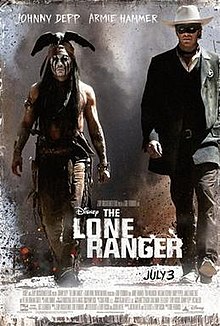The Lone Ranger
Also up at Channel 24.
What its about
Native American
legend, Tonto, tells a young boy the story of how straight-laced
district attorney became his partner, the outlaw known as the Lone
Ranger.
What we thought
Enough has
probably been said about how The Lone Ranger is effectively “Pirates
of the Caribbean on Horseback” but that doesn't make the analogy
any less accurate. The Lone Ranger does, after all, share the same
star, producer and director as the first three Pirates films and it
replicates both the distinctively knockabout action scenes of those
films, as well as most of their many, many flaws.
The Lone Ranger
is, of course, an enduring part of American pop culture that started
off as a radio serial in 1933 and has since appeared in movies, movie
serials, books, comic books, comic strips, cartoons and TV shows.
While this new film might clearly be an attempt to resurrect the old
favourite for a new generation and may fail entirely to do so
(reviews, word of mouth and box office returns have been, to be
charitable, underwhelming), it is innocuous and bland enough not to
do too much damage to a character that has been around longer than
Superman.
First, the good
news. Despite what all the marketing may suggest, The Lone Ranger is
very much the lead character in his own movie and Arnie Hammer is
charismatic and likeable in the role. Despite this being an origin
story, The Lone Ranger's characterisation is somewhat weak and
underdeveloped but Hammer clearly makes the best of what he has to
work with and he alone makes the film worthy of its storied title.
The best thing by
far about the film, though, is the really beautiful (and smartly 2D)
cinematography that makes the very best of the film's photogenic
Texan (and Utahan) vistas. The action scenes too are nicely, if
rather lengthily, shot and the film does work, at least for a while,
as something of a visual feast.
The problem is
that spectacular visuals and solid leading men only get you so far –
and in a film that limps in at a very unrespectable 150 minutes, it's
nowhere near far enough. The movie has a nicely stripped down story
of revenge and outlaw justice but both the story and its pulpy
character demand a snappy 90 minute feature, rather than the horribly
bloated epic-wannabe that we get here. Director Gore Verbinski
refuses to reign in his own indulgences and his film is all the worse
for it.
Similarly typical
of Verbinski's worst tendencies is the film's utter lack of tonal
inconsistency as its callous violence sits uncomfortably next to its
cartoonish slapstick and its more adult themes feel entirely at odds
with the film's more childlike sensibilities. To be fair, its mix of
“edgy” but utterly bloodless violence and kidtastic aesthetic may
well appeal to ten to twelve year old boys but people of any other
age group and, for that matter, gender will probably be left
wondering what on earth Verbinski is trying to get at.
And then there is
the Tonto problem. The film has a number of notable actors providing
solid, if undistinguished, support throughout but the film's main
“actor in a supporting role” is obviously Captain Jack Sparrow.
Tonto, you see, isn't played by the amazingly versatile Johnny Depp
who, over his three decades in the business has amassed at least a
dozen truly spectacular performances, which have in turn established
him as one of the very finest actors of his generation.
No, he's played by
Captain Jack Sparrow who may have been a breath of anarchic fresh air
in the first Pirates of the Caribbean film but wore out his welcome
within minutes of turning up in its first sequel. You can paint him
white, put a dead bird on his head and give him an “Injun” accent
but, make no mistake, this is Captain Jack doing his best to further
wreck the reputation of the man we once knew as Johnny Depp.
And I
hate to so much as approach this particular political minefield but
why is Tonto still, some 13 years into the 21st
century, being played by a white dude in “red face” rather than
an actual American Indian/ Native American (whatever the preferred
term is these days) actor?
Not that that
would have made that much difference, to be fair - iffy politics or
no iffy politics, The Lone Ranger would still be the artistic (and,
lets not kid, commercial) failure that it has turned out to be. It's
not terrible and it's even quite watchable for the first half or so
but The Lone Ranger fails hopelessly to live up to its legend or to
Rango, Verbinski and Depp's previous and largely successful attempt
at a proper - if admittedly quirky and similarly tonally nutso -
Western.


Comments
Post a Comment